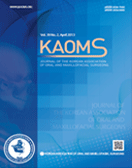Journal of the Korean Association of Oral and Maxillofacial Surgeons
- P-ISSN2234-7550
- E-ISSN2234-5930
- SCOPUS, KCI, ESCI
 ISSN : 2234-7550
ISSN : 2234-7550
A little-known relationship between immune recovery syndrome and herpes zoster
Manjunath Kurki (Sri Hasanamba Dental College)
Vagdevi Hosur (Sri Hasanamba Dental College)
Piyush Sukhija (Sri Hasanamba Dental College)
Atul Bajoria (Sri Hasanamba Dental College)
Abstract
Following anti-retroviral therapy (ART) or highly active antiretroviral therapy, there is an increased response to latent infections such as herpes zoster, which may lead to their reactivation. This is a result of improved immunity brought about by ART, also termed immune recovery syndrome. A 75-year-old male patient arrived at our institute with widespread vesicles and scabs on the right half of his face and oral cavity, suggesting the involvement of the trigeminal nerve. The patient had a history of being on ART two months earlier and a history of tooth extraction eight days prior to his arrival at our institute. The incidence of human immunodeficiency virus (HIV)-positive cases amongst herpes zoster cases is high, and these patients become suscep-tible to infections following ART. Therefore, regardless of the presence of risk factors, every herpes zoster patient should be tested for HIV infection, and high anti-retroviral therapy should be commenced/reinstituted as soon as possible. In addition, the treating physician should maintain a high level of vigilance for the patient during the first few months of ART, the peak incidence of immune recovery inflammatory disease.
- keywords
- Herpes zoster, HIV, Immune recovery syndrome, Anti-retroviral therapy
- Downloaded
- Viewed
- 0KCI Citations
- 0WOS Citations